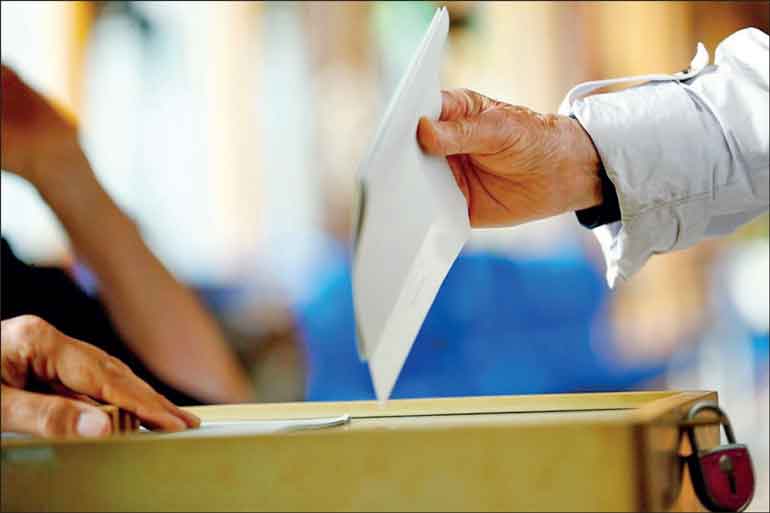Tuesday Feb 24, 2026
Tuesday Feb 24, 2026
Wednesday, 14 May 2025 00:45 - - {{hitsCtrl.values.hits}}

Local Government elections in fact must be about the small parts that constitute the whole
 The trees
The trees
The quotation “Missing the wood for the trees” means being unable to see the whole picture or larger context because one is fixated on minor details or individual components. It suggests a lack of perspective and an inability to understand the bigger picture due to being too focused on the small parts. This catchy phrase originated as part of the works of John Heywood, an English writer known for his plays, poems, and collection of proverbs, circa 1546. It is an idiom used of someone who is too involved in the details of a problem to look at the situation as a whole. (https://www.cmfgroup.com/blog/ healthcare-professionals/sometimes-we-cannot-see-the-forest-for-the-trees/#:~:text=This%20catchy%20phrase%20 originated%20as,the%20situation%20as%20a%20whole)
However, Local Government elections in fact must be about the small parts that constitute the whole. It must be about local issues and which party or individual at grassroots level is close to the people and can work with the people to attend to matters at local level. It is a misplaced assumption and a misguided promotion that Local Government elections are about national issues, and they are like a referendum on a party in power at national level. As much as a wood would be barren if there are no trees in it, a country would be similarly barren if it does not have a strong, participative local government that represents the people at grassroots level.
A strong local government system should be the backbone of a country’s political system, but not necessarily constituted as a partisan political system as would be mentioned later in this article.
Perhaps the staging of local government elections should precede a national general election if a bottom-up approach is to replace the bottom down approach that the country has experienced for many decades. While there are some issues that are essentially national in nature like defence and foreign policy, taxation and major infrastructure developments, policies pertaining to many other areas need to consider local situations, wider consultations with people, and national policy formulation linked to such grassroots participation on local issues.
While a governing party, in this instance the NPP, would have strived to bask in the glory of their presidential and general election successes and win the local government election on the strength of those successes, such a line of thought would not have been necessarily the best outcome for the local government bodies and the people at grassroots level. At such a level what matters is the record of efficiency and the effectiveness of those who have been members of local government bodies and those who are aspiring to be members and who have their ears to the ground their eyes on the people in towns and villages in local government areas. In this context, people would be the best judges as to who should represent them at local government level on matters that are essentially local in nature. Success at presidential or general elections should not automatically translate into success at local government level, unless those contesting could demonstrate they are well across local issues and are able to offer solutions for such local issues.
 Many analysts, and of course Opposition politicians have seized on the drop in votes for the NPP at the 6 May Local Government election. Reportedly only about 60% of the 17.14 million electorate turned out to vote on Tuesday, down from nearly 70% in the November General election and 80% in the September Presidential vote. While voter fatigue after two major elections could well be one reason for the drop in vote, as far as the governing party is concerned, which more or less campaigned on the strength and success of the two preceding national elections, their own supporters may have been lulled into thinking that local government elections do not count for much since presidential and general election powers were with them. Some may have opined that promises made have not been delivered and decided not to vote although the NPP Government has been in power for less than six months and the national budget passed only in April this year.
Many analysts, and of course Opposition politicians have seized on the drop in votes for the NPP at the 6 May Local Government election. Reportedly only about 60% of the 17.14 million electorate turned out to vote on Tuesday, down from nearly 70% in the November General election and 80% in the September Presidential vote. While voter fatigue after two major elections could well be one reason for the drop in vote, as far as the governing party is concerned, which more or less campaigned on the strength and success of the two preceding national elections, their own supporters may have been lulled into thinking that local government elections do not count for much since presidential and general election powers were with them. Some may have opined that promises made have not been delivered and decided not to vote although the NPP Government has been in power for less than six months and the national budget passed only in April this year.
The line of thought that a government at national level should have control over local government entities simply because of such power, without a focus on local issues and how to address them, is a line of thought that does not produce optimum democratic outcomes for the people at grassroots level. In fact, the results of the 6 May election, with many local bodies requiring coalitions of some sort, either multi-party, or with independents, to be able to govern the local body has restored a welcome degree of democracy that is good for the country.
However, this gain will be negated if the Opposition political parties’ desire to group together is only to cause embarrassment to the NPP national government and thwart their programs and activities at Presidential and National Parliament level using local bodies as platforms for their political and personal gain and not for the sake of the people at local government level.
Ideally, elections at local government level should be nonpartisan to the extent possible, as at this level, governance is more about operational issues that impact on people at this level than about policy formulation on national issues. Avenues to make local government entity elections based on electing independents of proven capability rather than electing representatives of national political parties to local government entities should be seriously considered by the people. Political divisions at this level further alienate people from each other based on the political labels they carry. Minimising such divisions and taking the path of aggregation rather than segregation is a system change that needs to be considered by all political parties.
One can only hope that all political parties will grasp the opportunity now to govern with a difference and govern for the well-being of the people belonging to their local government entities rather than using the entities as platforms to further their political ambitions.
If people at grass root level, as constituents of local government entities are independent minded, they will be better able to view national policy formulation from a more constructive point of view and consider policies offered by political parties at national level with much less bias and more from the perspective of what policies are best for the country rather than for any political party. Outcomes for the country will decidedly be better if partisan political divisions begin and end at national level and divisions even at this level are based on policy differences, not personal or other pseudo differences, and their ability to plan and incorporate their policy action plans, as strategic plans in their manifestos. Hopefully this would create a pathway to end the NATO syndrome of No Action, Talk Only, as manifestos would then become part of the accountability process at national level should a particular political party win a general election.
Irrespective of which party or political grouping is running local government entities, they all must subscribe to accountability policies legislated by the National Parliament to ensure uniformity of accountability policies across all local government entities. While programs and priorities of local government entities may vary, accountability policies pertaining to programs should not vary as fundamentally, all programs of entities are financed by the people and therefore accountability to the people via national legislation considered as a moral and legal necessity.
Several local government entities have been accused of waste, bribery and corruption from time to time and there appears to be a need to review existing accountability policies and processes and fill any voids with the appropriate legislation to strengthen them and hold all local government entity expenditure accountable to the people. Legislation should provide for enforcing strict punishment for those found guilty of violation of the law and misappropriation of funds.
The wood
As noted earlier, the “wood” in the context of this article is the political structure at national level comprising of an Executive Presidency, a Parliament, a government which enjoys the majority support in Parliament, and an Opposition, or as one might say, an alternate government in waiting, all of whom are responsible for national policy development. Ideally, each of these entities should be elected by the people based on the policies they offered to the people at an election. In this context, the Opposition has a role and a responsibility to make sure the government complies with their manifesto that was offered as a policy composite to the people but has even a more important role in offering their alternate policy options as per their own manifesto and any new ideas and proposals as constructive alternate options to government actions.
This might be asking for too much from Sri Lankan Opposition parties who have habitually just criticised governments rather than offering alternate constructive options for consideration by governments.
The role and responsibilities of provincial authorities who in a way are neither the wood nor the trees, will have to be reviewed and their form, substance and responsibilities clarified.
The provincial councils were established consequent to the provincial council’s act of 1987 at the behest of India as a means of appeasement to wean the LTTE from their separatist agenda. The LTTE rejected the provincial council system, and so did the Tamil political parties. The act provides for activities that are to be managed by provincial councils, activities that are within the province of the national government, and activities that are to be jointly administered.
Overall, provincial councils have functioned more as administrative centres rather than as political centres. It appears that a significant amount of duplication of administrative activities occur due to the lack of clarity and direction on the national government’s role and that of provincial councils. Their future and their future role needs to be reviewed, and a decision taken whether they belong to the wood or are part of the trees. On the face of it, it does appear that they have a role in a devolved administrative system but not in a devolved political system
The NPP Government included the introduction of a new Constitution in their manifesto, and it is hoped that wide consultations and reviews will occur of all political institutions at all levels and findings and suggestions will be considered when drafting a new Constitution.